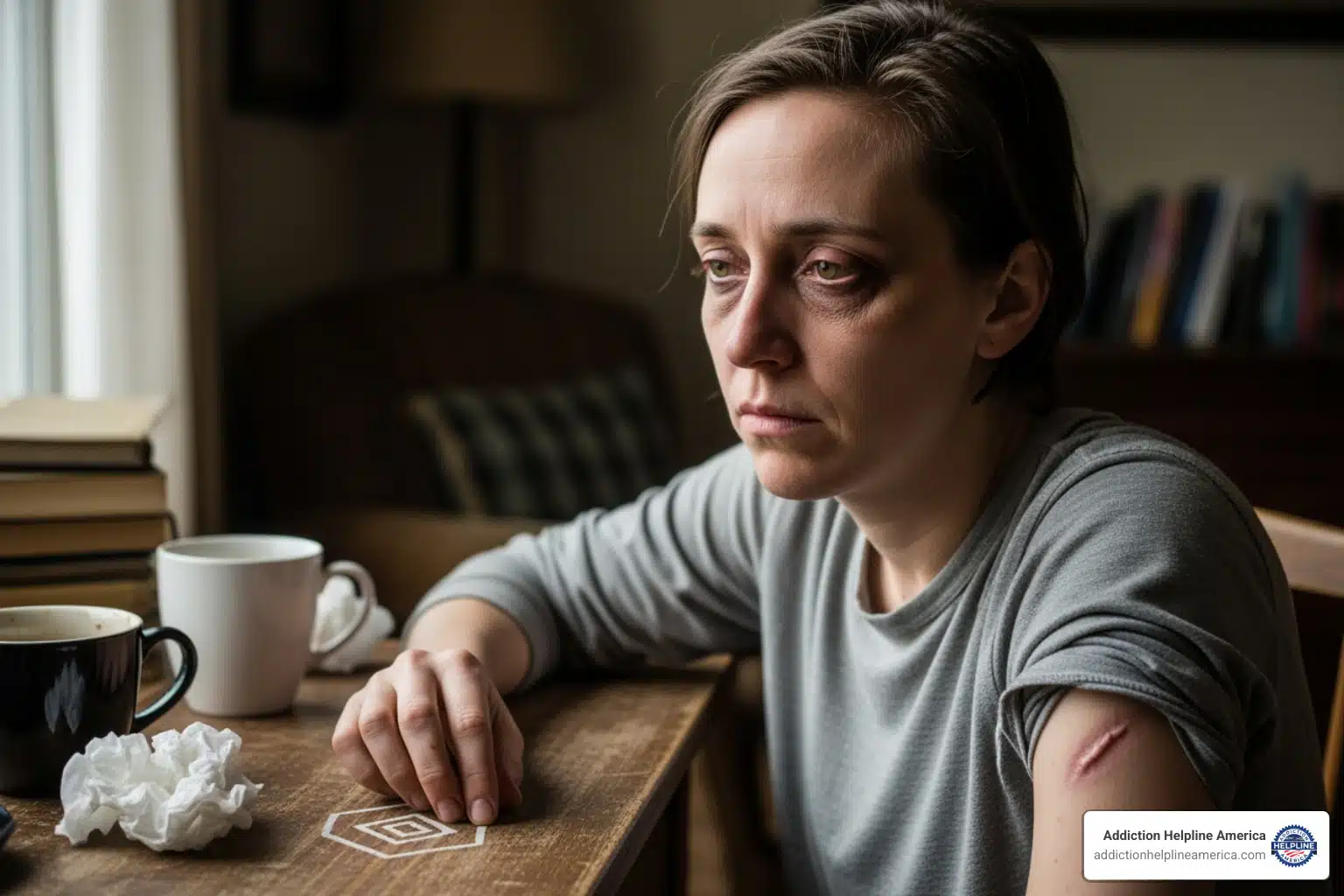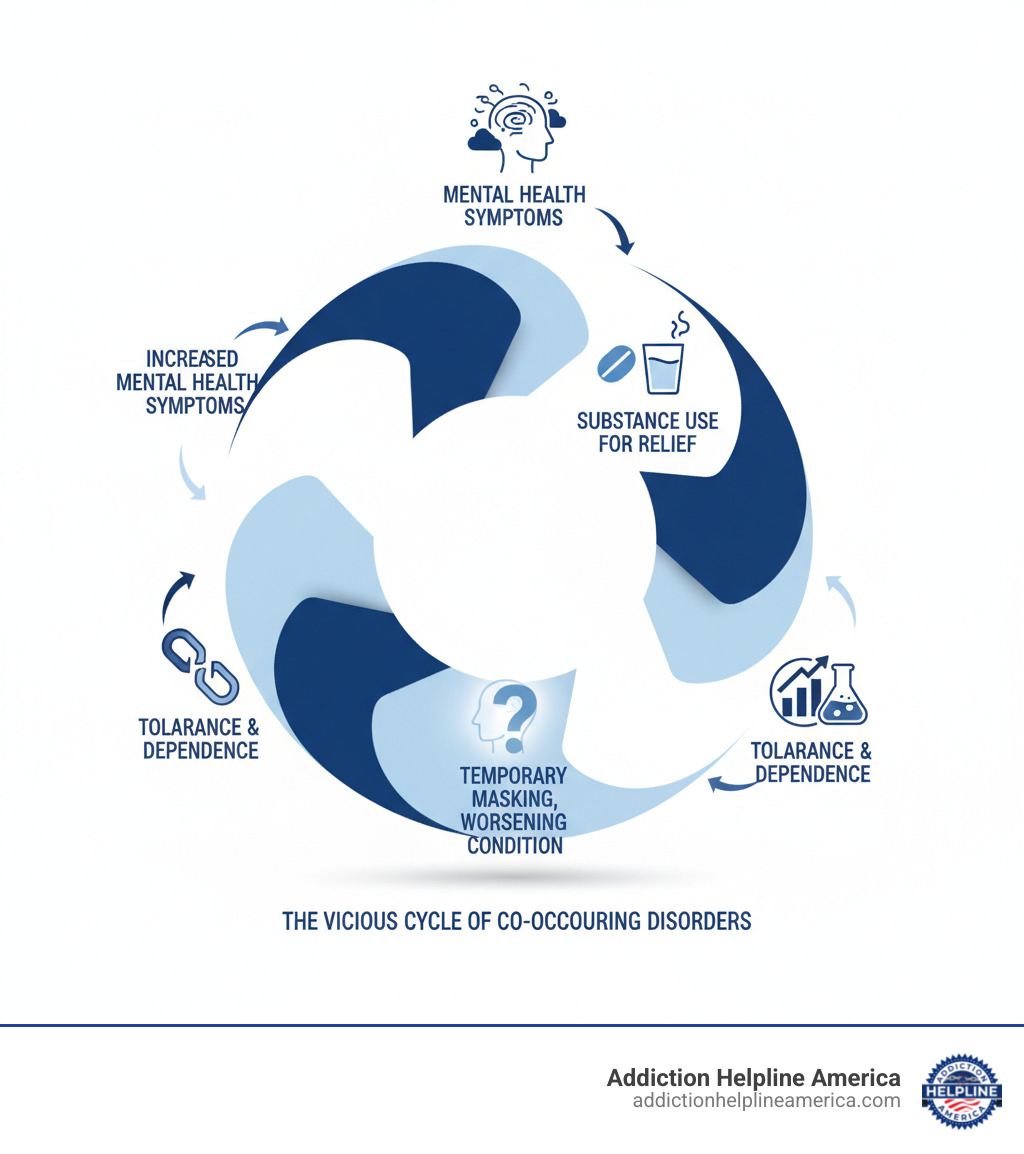
Why Understanding Addiction and Mental Health Together is Life-Changing
Addiction and mental health disorders rarely travel alone. When someone struggles with substance use, there’s often an underlying mental health condition fueling the cycle—and vice versa.
Key Facts About Co-Occurring Disorders:
- 50% of people with severe mental disorders are affected by substance abuse
- 53% of drug abusers also suffer from serious mental illness
- 7.7 million adults in the US have both conditions simultaneously
- Self-medication is a common pathway where people use substances to cope with untreated mental health symptoms
- Integrated treatment addressing both conditions together shows the highest success rates
The connection is biological. Both addiction and mental illness affect the brain’s reward, decision-making, and impulse control centers. This overlap explains why self-medication is so common—using alcohol to quiet anxiety or opioids to numb trauma.
But here’s what gives us hope: understanding this connection is the first step toward breaking free from both conditions.
At Addiction Helpline America, we help people steer the complex relationship between addiction and mental health. Our specialists know that lasting recovery means treating both the substance use and the underlying mental health condition together.
The Vicious Cycle: How Addiction and Mental Health Fuel Each Other
Feeling anxious, you have a drink to calm down. It works temporarily, but the next morning, your anxiety is worse. This is the reality of co-occurring addiction and mental health disorders: each “solution” creates a bigger problem.
Substances like drugs and alcohol disrupt your brain’s natural chemistry (dopamine, serotonin) that regulates mood and behavior. They provide an artificial boost that feels good, but the brain adapts by producing fewer of its own “feel-good” chemicals. This change worsens both addiction and mental health symptoms over time.
Understanding how drugs and alcohol interact with the brain helps explain why breaking this cycle requires more than just willpower.
What is a Co-Occurring Disorder?
A co-occurring disorder, or dual diagnosis, happens when someone has both a substance use disorder and a mental health condition. There’s a deep, interconnected relationship where each condition makes the other stronger. This bidirectional relationship means that when one condition goes untreated, the other almost always gets worse. It’s like trying to heal a broken leg while someone keeps hitting it with a hammer—you can’t make real progress until you address both problems.
These aren’t just statistics—they represent millions of people who’ve felt trapped in this cycle, wondering why traditional treatment approaches haven’t worked for them.
Common Mental Health Conditions Linked to Addiction
Some mental health conditions have a particularly strong connection to substance use, as people try to cope with their symptoms.
Depression often co-occurs with alcohol or other depressants used to numb hopelessness, which ultimately worsens depression by depleting the brain’s mood regulators.
Anxiety disorders frequently lead people to use alcohol or sedatives for temporary relief from panic or social anxiety, but this can cause “rebound anxiety” that is even more intense.
Post-Traumatic Stress Disorder (PTSD) has a very strong link to substance use. Many people use drugs or alcohol to escape flashbacks, nightmares, and the emotional pain of trauma.
Bipolar disorder and substance use can occur during both manic phases (reckless behavior) and depressive phases (coping with low moods), further destabilizing mood swings.
People with ADHD may self-medicate with stimulants to improve focus or depressants to calm hyperactivity, which can spiral into addiction and worsen ADHD symptoms when the substance wears off.
Schizophrenia and substance use are strongly linked. Substances may be used to mask distressing symptoms like hallucinations but can also trigger psychotic episodes.
Eating disorders share traits with addiction, like low self-esteem and a need for control. Misuse of diet pills, laxatives, or stimulants can evolve into a substance use disorder.
The Self-Medication Trap
The self-medication trap begins when a substance provides immediate relief from mental health symptoms like anxiety or depression. This temporary fix becomes a go-to coping mechanism. As tolerance builds, you need more of the substance for the same effect, creating a cycle of dependence. All the while, the substance use is worsening the underlying mental health condition, leaving you fighting two interconnected battles.
This is why so many people feel frustrated when traditional addiction treatment doesn’t work. You can’t successfully treat addiction while ignoring the mental health condition that’s driving it. The good news? Understanding this cycle is the first step to breaking free from it.
Shared Origins: Unpacking the Risk Factors for Co-Occurring Disorders
The reasons addiction and mental health disorders so often appear together are complex, like the tangled roots of a tree. Shared risk factors in genetics, trauma, and environment create a vulnerability to both conditions.
These shared risk factors weave together, creating a perfect storm that can make someone more vulnerable. Understanding these connections helps us see why treating both issues together is so important.
Genetic and Biological Vulnerabilities
Genetics play a significant role, with research showing they account for 40-60% of the risk for substance use disorders. A family history of addiction or mental illness, combined with innate differences in brain structure and neurotransmitter levels (like dopamine), can create a biological vulnerability to both conditions.
The Profound Impact of Trauma and Stress
There’s a powerful correlation between trauma and addiction. Trauma, especially in childhood, can alter brain development and increase the risk for both PTSD and addiction. Many trauma survivors use substances to cope with distressing symptoms like flashbacks and hypervigilance. Chronic stress from work, finances, or relationships also wears down coping abilities, leading many to self-medicate, as seen during the COVID-19 pandemic.
Environmental and Social Influences
The world around us shapes our mental health and relationship with substances in powerful ways.
- Poverty: The chronic stress of poverty significantly increases the risk of poor mental health and substance use as a coping mechanism.
- Peer pressure: Especially for young people, peer pressure can lead to early substance use, a major risk factor for developing addiction.
- Lack of access to healthcare: When professional mental health or addiction services are unavailable or unaffordable, people are often left to self-medicate their symptoms.
- Social isolation: Loneliness worsens mental health symptoms and removes the social support that can protect against substance misuse.
- Stigma: The fear of being judged prevents many from seeking help for mental illness, leading them to suffer in silence and self-medicate with substances.
Young people aged 15 to 24 are especially vulnerable, as this is a peak time for the onset of mental illness and substance use disorders.
Recognizing the Signs and Seeking Help for a Dual Diagnosis
Recognizing the signs of a co-occurring disorder can be difficult, as symptoms of addiction and mental health issues often overlap. However, early identification is the first and most crucial step toward getting effective help.
Key Signs and Symptoms to Watch For
Look for significant changes in behavior, mood, and daily functioning. While not a substitute for a professional diagnosis, these are common red flags:
- Social withdrawal: Avoiding friends, family, and activities they once enjoyed.
- Changes in sleep and appetite: Drastic shifts like insomnia, oversleeping, or significant weight changes.
- Continued use despite consequences: Using substances even when it causes problems with health, work, or relationships.
- Withdrawal symptoms: Experiencing physical or psychological distress (shaking, anxiety, nausea) when trying to stop.
- Using substances to function: Relying on drugs or alcohol to perform normal daily activities or cope with feelings.
- Extreme mood swings: Unpredictable emotional highs and lows that seem out of character.
- Neglecting responsibilities: A decline in performance at work or school, and a failure to manage personal or family duties.
Denial, driven by shame and fear, is a common barrier. Acknowledging the problem is the hardest but most vital step toward healing.
The Critical Role of Professional Screening
Because symptoms overlap, self-diagnosis is unreliable. A professional screening by a licensed expert is essential for an accurate diagnosis. A professional can differentiate between symptoms of substance use, a primary mental health disorder, or both. They assess your full history to understand the “why” behind the substance use—such as self-medication for an underlying condition. This comprehensive evaluation is the foundation for an effective, integrated treatment plan.
Addiction Helpline America connects you with specialists in dual diagnosis who can provide an accurate assessment and guide you toward the right integrated care.
The Path to Healing: Why Integrated Treatment for Addiction and Mental Health is Crucial
For co-occurring addiction and mental health challenges, integrated treatment is the most effective approach. It means addressing both the substance use disorder and the mental health condition at the same time, with one cohesive team, ensuring the whole person is treated, not just isolated symptoms.
Why Treating Both Conditions Simultaneously is Non-Negotiable
Treating these conditions separately often fails. Integrated treatment is non-negotiable because it:
- Delivers higher success rates by breaking the cycle where one condition fuels the other.
- Prevents relapse by addressing the underlying mental health issues that may trigger substance use.
- Addresses root causes like trauma or stress that contribute to both disorders.
- Avoids fragmented care, where uncoordinated treatment leads to gaps in recovery.
Exploring Treatment Options for addiction and mental health
Your integrated treatment plan should fit your unique situation. Common options include:
Medical detoxification: A safe, medically supervised first step to manage withdrawal symptoms and stabilize the body for further treatment.
Inpatient rehabilitation: Provides 24/7 support in a trigger-free environment. Ideal for severe cases, it includes intensive therapy, medication management, and peer support.
Outpatient programs: Offer flexible treatment for those with stable home lives. Programs vary in intensity, from several hours a day to weekly sessions.
| Inpatient Treatment | Outpatient Treatment |
|---|---|
| Environment: Live at facility with 24/7 supervision | Environment: Live at home, attend scheduled sessions |
| Intensity: Daily therapy and structured activities | Intensity: Several sessions per week, varying levels |
| Support: Constant access to staff and peer community | Support: Scheduled sessions with some peer interaction |
| Best for: Severe dual diagnosis, unstable living situations, high relapse risk | Best for: Stable home life, work/family obligations, step-down from inpatient |
Cognitive Behavioral Therapy (CBT): A core therapy that teaches you to identify and change the negative thought patterns and behaviors that fuel both addiction and mental health symptoms.
Dialectical Behavior Therapy (DBT): Highly effective for intense emotions and trauma, teaching skills in mindfulness, distress tolerance, and emotion regulation.
Medication-Assisted Treatment (MAT): Uses medications to reduce cravings and withdrawal symptoms (e.g., for opioid or alcohol use) or to stabilize mood (e.g., antidepressants), supporting overall recovery.
Building a Foundation for Long-Term Recovery
Treatment is just the beginning. Long-term recovery requires a strong foundation of support.
- Peer support groups: Groups like Dual Recovery Anonymous, AA, NA, and SMART Recovery provide invaluable connection and shared understanding.
- Aftercare planning: A crucial step that includes ongoing therapy, medication management, and support groups to sustain recovery. Consistent aftercare dramatically improves long-term outcomes.
- Healthy coping skills: Developing new ways to handle stress and emotions, such as exercise, mindfulness, or creative hobbies, is essential to replace substance use.
- Relapse prevention: Creating a plan to identify personal triggers and warning signs, and knowing who to call for help, prepares you to handle setbacks without derailing your progress.
Frequently Asked Questions about Co-Occurring Disorders
Understanding the link between addiction and mental health brings up many questions. Here are answers to some of the most common concerns we hear at Addiction Helpline America.
Which comes first, the addiction or the mental illness?
This is a classic “chicken or egg” question with no single answer. Sometimes, a mental health issue like anxiety leads to self-medication and then addiction. Other times, chronic substance use changes brain chemistry, triggering a mental illness. Often, both stem from shared risk factors like trauma or genetics.
Which came first is less important than treating both conditions simultaneously.
Can you truly recover from a dual diagnosis?
Yes, absolutely. Recovery from a dual diagnosis is entirely possible. With integrated treatment that addresses both conditions, people live fulfilling lives every day. Recovery is an ongoing process, much like managing a chronic illness, and may require long-term therapy or support. The goal is to learn healthy coping skills and build a strong support system to manage symptoms and enjoy a life of purpose and joy.
How can I help a loved one with a suspected dual diagnosis?
It’s heartbreaking to watch a loved one struggle. Here’s how you can help:
- Approach with compassion: Talk to them calmly, without judgment. Express your concern using specific examples, like, “I’ve noticed you seem down lately, and I’m worried about your drinking.”
- Encourage professional help: Offer to help them find a specialist in co-occurring disorders or go with them to an appointment.
- Set healthy boundaries: It’s crucial to protect your own well-being. This means not enabling their behavior (e.g., giving money for substances) and not tolerating abuse. Boundaries can motivate them to seek help.
- Get support for yourself: You don’t have to do this alone. Groups for families of those with addiction and mental illness can provide guidance and emotional relief.
Conclusion: Taking the First Step Towards Integrated Recovery
This article has shown a fundamental truth: addiction and mental health are two sides of the same coin. We’ve seen how they create a vicious cycle fueled by shared risk factors like genetics, trauma, and stress. The most important takeaway is that lasting recovery comes from integrated treatment that addresses both conditions simultaneously. Understanding this connection is the key to breaking free.
Your Path to a Healthier Future Starts Now
If you or a loved one is struggling with co-occurring addiction and mental health disorders, know this: you are not alone, and you are not broken. Millions face this same challenge. Recovery is not about perfection; it’s about learning to manage both conditions to live the life you deserve. The path to a healthier future begins with one step.
Finding the Right Support for addiction and mental health
Finding the right help shouldn’t be another struggle. At Addiction Helpline America, our mission is to simplify this process. We provide free, confidential, and personalized guidance to connect you with the right integrated care program from our trusted network.
We listen to your story and help you find options—from detox to outpatient therapy—that treat both addiction and mental health together. You deserve comprehensive care. Let us help you take the first step.
Our helpline is 100%
free & confidential
If you or someone you care about is struggling with drug or alcohol addiction, we can help you explore your recovery options. Don’t face this challenge alone—seek support from us.
Programs
Resources
Will my insurance
cover addiction
treatment?
We're ready to help
Find the best
drug or alcohol treatment
center
Are you or a loved one struggling with addiction? Call today to speak to a treatment expert.
















